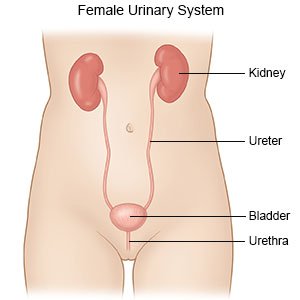Chronic Urinary Retention in Women
Medically reviewed by Drugs.com. Last updated on Sep 23, 2025.
Chronic urinary retention (CUR) is a long-term condition that develops when your bladder does not empty completely when you urinate.
 |
DISCHARGE INSTRUCTIONS:
Seek care immediately if:
- You have severe abdominal pain.
- You are breathing faster than usual.
- Your heartbeat is faster than usual.
- Your face, hands, feet, or ankles are swollen.
Related medications
Treatment options
The following list of medications are related to or used in the treatment of this condition.
Contact your healthcare provider or urologist if:
- You have a fever.
- You have pain when you urinate.
- You see blood in your urine.
- You have problems with your catheter.
- You have questions or concerns about your condition or care.
Catheter care:
- You may need a catheter while you are at home. Healthcare providers will give you a smaller leg bag to collect urine. Keep the bag below your waist. This will prevent urine from flowing back into your bladder and causing an infection or other problems. Also, keep the tube free of kinks so the urine will drain properly. Do not pull on the catheter. This can cause pain and bleeding, and may cause the catheter to come out. Ask your healthcare provider or urologist for more information on catheter care.
- A straight catheter may be inserted several times a day if you cannot urinate on your own. You put the catheter in your urethra and remove it once your bladder is empty. Ask your healthcare provider or urologist for more information about how to catheterize yourself.
Follow up with your healthcare provider or urologist as directed:
Write down your questions so you remember to ask them during your visits.
© Copyright Merative 2025 Information is for End User's use only and may not be sold, redistributed or otherwise used for commercial purposes.
The above information is an educational aid only. It is not intended as medical advice for individual conditions or treatments. Talk to your doctor, nurse or pharmacist before following any medical regimen to see if it is safe and effective for you.
Learn more about Chronic Urinary Retention
Treatment options
Care guides
Further information
Always consult your healthcare provider to ensure the information displayed on this page applies to your personal circumstances.
